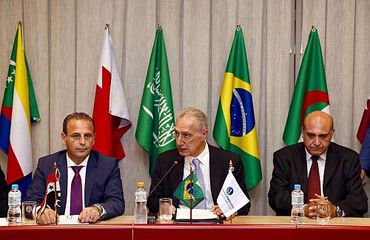São Paulo – Syria’s minister of Health, Nizar Yazigi, said, in an interview to ANBA on Monday (30) evening, that his government is searching, in Brazil, for pharmaceutical suppliers and companies that can invest in the manufacturing of drugs in the Arab country. Yazigi is in São Paulo to attend the World Hepatitis Summit, which will be held from November 1 to 3 in São Paulo, and was welcomed for dinner at the Arab Brazilian Chamber of Commerce.
“We have two goals: the first is to buy medicines to meet the necessities of Syria; the second is to establish plans for joint production lines with foreign companies in Syrian territory,” said the minister. According to him, the country traditionally imports pharmaceuticals for chronic diseases, cancer treatment and vaccines. “Since before the crisis,” he said.
Yazigi said that until 2010, Syria had a modern pharmaceutical industry and used to export pharmaceuticals to other countries in the Middle East and North Africa, but that with the beginning of the civil conflict in 2011, 20 out of the 70 drug plants were shut down. “Despite the war, it was possible to put into operation again 16 of these 20 pharmaceutical plants, but not at full capacity,” he said. He added that the government plans to authorize the construction of ten new plants.
The minister pointed out that the government supplies drugs free of charge to the population, but beyond the impact of the conflict in the local industry, drug imports were affected by the international embargos imposed on Syria. In this sense, he’s looking for suppliers “in friendly countries.” “In the BRICS, especially,” he said, mentioning the bloc that includes Brazil, Russia, India, China and South Africa.
Yazigi said that, in 2015, he visited Cuba, which started to supply pharmaceuticals to Syria, and more recently, he travelled to Iran, Russia, Belarus, China and India. “To see what products are available in these countries that Syria needs,” he explained.
However, to facilitate deals with Brazil, he said that both governments need to sign a memorandum of understanding in the pharmaceutical sector, despite the existence of a bilateral cooperation agreement for the same area, signed when Syrian president Bashar Al Assad visited Brazil in 2010.
In August, four Brazilian pharmaceuticals and cosmetics companies took part in a stand organized by Brazil’s embassy at the Damascus International Fair, held for the first time since 2011.
Cooperation
After a meeting of the minister with the Arab Chamber’s board of directors, the Chamber’s president, Rubens Hannun, pointed out that the community of Syrian origin in São Paulo and in the country as a whole “is considerable” and that the visit is important, and that for the Chamber it is relevant to follow the events in the Arab nation.
“This makes us very willing to collaborate with Syria’s reconstruction,” said Hannun. “Not only to generate deals to Brazilian companies, but also from the social point of view,” he added, referring to attending the needs of the population.
The vice president of Marketing of the Arab Chamber, Riad Younes, who is a physician, gave a presentation to the minister about a bilateral cooperation agreement that was being worked on before the conflict in Syria. At the time, Younes was the director of the Syrian-Lebanese Hospital, in São Paulo, and Brazilian professionals were participating in an exchange program with Syrian doctors in the field of liver transplant, with the goal to train the Syrians in this specific procedure, but which was cancelled.
“He (the minister) said that he really enjoyed it and thanked the efforts of the Arab Chamber (which supported the project) and said that he would love to see this initiative implemented,” said Younes, who currently is a director of German Hospital Oswaldo Cruz.
*Translated by Sérgio Kakitani




